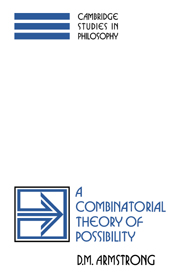Book contents
- Frontmatter
- Contents
- Preface
- PART I NON-NATURALIST THEORIES OF POSSIBILITY
- PART II A COMBINATORIAL AND NATURALIST ACCOUNT OF POSSIBILITY
- 3 Possibility in a simple world
- 4 Expanding and contracting the world
- 5 Relative atoms
- 6 Are there de re incompatibilities and necessities?
- 7 Higher-order entities, negation and causation
- 8 Supervenience
- 9 Mathematics
- 10 Final questions: logic
- Works cited
- Appendix: Tractarian Nominalism, by Brian Skyrms
- Index
6 - Are there de re incompatibilities and necessities?
Published online by Cambridge University Press: 05 June 2012
- Frontmatter
- Contents
- Preface
- PART I NON-NATURALIST THEORIES OF POSSIBILITY
- PART II A COMBINATORIAL AND NATURALIST ACCOUNT OF POSSIBILITY
- 3 Possibility in a simple world
- 4 Expanding and contracting the world
- 5 Relative atoms
- 6 Are there de re incompatibilities and necessities?
- 7 Higher-order entities, negation and causation
- 8 Supervenience
- 9 Mathematics
- 10 Final questions: logic
- Works cited
- Appendix: Tractarian Nominalism, by Brian Skyrms
- Index
Summary
INTRODUCTORY REMARKS
In this chapter we examine a serious difficulty for Combinatorialism.
The Combinatorialist scheme depends on all combinations of universals being compossible. It should be possible for a single individual to instantiate any such combination, provided only that the universals so combined are wholly distinct, having no common constituents. For if we do not have this promiscuous compatibility, then we get logical incompatibility of a sort not envisaged by the theory.
If we consider what passes for properties and relations in our ordinary thinking, however, then we find that failures of cornpossibility abound. Consider properties first. These characteristically appear in ranges, so that they form classes of determinates falling under the one determinable. An individual can, at one time, instantiate only one member of this given range. The colour incompatibilities are a notorious instance of this phenomenon. Historically, they seem to have furnished one of the reasons Wittgenstein had for abandoning the metaphysics of the Tractatus.
Problems also arise in the case of relations. Restricting ourselves for the sake of simplicity to dyadic relations, problems are raised by symmetrical, by asymmetrical and by transitive relations. If a has symmetrical R to b, then it is entailed that b has R to a. If a has asymmetrical R to b, then it is excluded that b has R to a. If, finally, a has transitive R to b, and b has R to c, then these two states of affairs entail a third state of affairs: a's having R to c.
- Type
- Chapter
- Information
- A Combinatorial Theory of Possibility , pp. 77 - 86Publisher: Cambridge University PressPrint publication year: 1989



